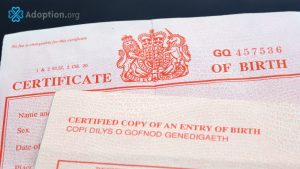Adoption laws vary from state to state. They vary in regard to how and when a child can be placed, what sort of training or home study the adoptive couple must have done, and how soon the adoption can be finalized. They also vary in their treatment of adoption records. Adoption records include any documentation regarding the adoption. Generally, the document the state has control over is the original birth certificate. In many states, when a child is adopted, their original birth certificate is “sealed”, and you are unable to access it without a court order.
For many adoptees, having this original birth certificate, with the name of their birth parents and their original name at birth listed, helps them feel as though they have a better grasp on their full identity. Many adoptees, particularly in closed adoptions, can go through life not knowing the name of one or both of their birth parents, what name their birth parents gave them at birth, or even what hospital they were born at. When the adoption occurs, all of this information is replaced with the adoptive parents’ information on the adoptees birth certificate.
There is a growing push from adoptees, and the adoption community in general, to make original adoption documents more available to adoptees and their families. In addition to birth certificates, this includes being able to have access to any documentation the agency or lawyer who oversaw their adoption may have. Many adoptees wonder how best to help join in the push for adoptees rights in this regard.
Generally, in order to have any adoption law changed, there needs to be a bill or statute proposed and adopted by your state’s legislative body. So, your first step would be to contact the representative from your district. A heartfelt letter explaining why this would mean so much to you is going to receive more attention than a brief email or phone call. Additionally, there will be more weight if you can assemble a group of adoptees who also want to see the laws regarding adoption records changed in your state. Look online for groups near you for adoptees or adoptive families. Facebook is a great place to start. You can then write a letter from the group, or have each member write their own letter, which would get the attention of your representative more than an individual letter would.
Undoubtedly, you will have to follow up with your representative and engage in some face-to-face advocacy as well to be a part of effectively changing the laws regarding adoption records in your state. If you assemble a strong group of individuals from your local adoption community, you can also find ways to network with other adoption-related groups around your state. While it may seem like a big undertaking, it is very possible that with enough attention and effort, you might be able to make real change. There is a famous quote from scientist Margaret Mead that is very applicable to this situation: “Never doubt that a small group of thoughtful, committed citizens can change the world; indeed, it’s the only thing that ever has.”
Julianna Mendelsohn lives in sunny South Florida where, odds are, it is hot enough right now that she’s sweating just a little, no matter what she’s doing. She is the brains, brawn, blood, sweat, and tears behind The Adoption Mentor and is thrilled to be able to help others build their families through adoption. She is a former elementary school teacher, current MS in school counseling student, Sephora junkie, and the momma via domestic adoption to one lovely daughter.
